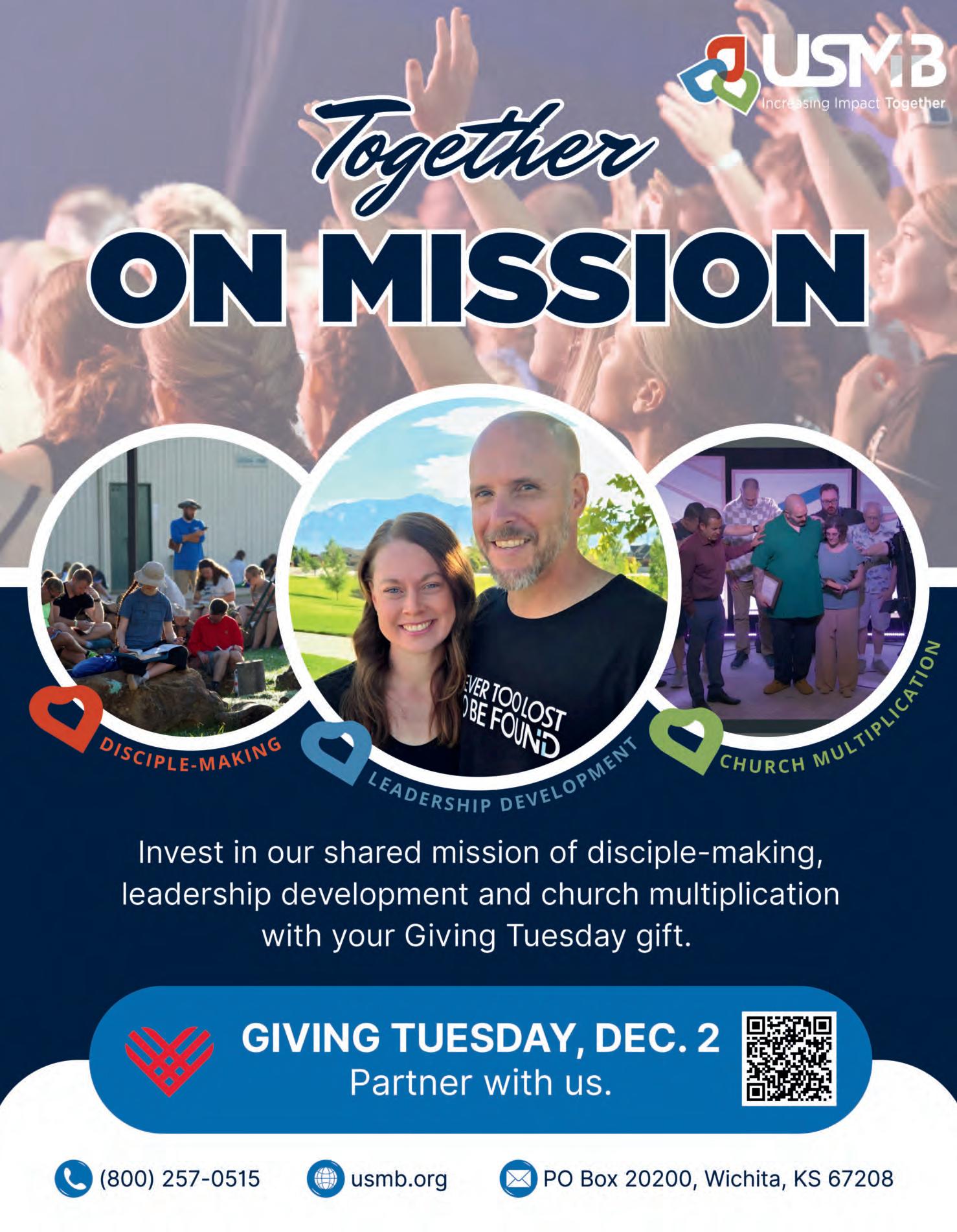








Christmas in Africa. That wasn’t something this Midwestern girl planned to experience while growing up with regular snow and ice storms each December.
“When we connect, commune and gather together, we dispel the lies we’ve bought into that no one cares.”
But there I was… serving in the Peace Corps in a tiny village in West Africa, and buying a plane ticket home for the holidays was out of the question. Instead, my parents packed a box of cocoa mix, candy canes, a jar of peanut butter and a solar-powered lamp and prayed it would arrive before the new year.
Christmas in Africa was lonely. After decades of candlelight church services and family gatherings with Grandma’s cookies, I found myself sleeping on a hard cot, sweating through the night and wondering if it was snowing back home.
But then something miraculous happened. I gathered with a group of other volunteers in a nearby town on Christmas day. We pooled our treasures from home - a box of macaroni and cheese, a bag of coffee beans, a bar of chocolate - and we sat in the loneliness… together.
We told stories and shared memories. We laughed and let tears of sadness converge with tears of joy. And while the loneliness didn’t disappear, the load became lighter.
When we connect, commune and gather together, we dispel the lies we’ve bought into that no one cares. Together, we throw off the wet blanket of loneliness that is weighing us down and urge each other to lean into the light.
In this month's issue, we dive into the very real emotion of loneliness, how it affects us and what, as Christ followers, we can do about it. You’ll read how loneliness affects people across generations (pg. 10), the highs and lows of solitude (pg. 12) and how loneliness can impact your health (pg. 14). Online, you’ll find insights on community and sacred solitude as keys to fighting loneliness.
What steps can we take to combat the loneliness we see around us?
It can be as simple (and terrifying) as inviting someone to grab a coffee or asking a new attendee to join you for lunch after church service. Maybe it’s offering a seat at your table during the holidays. The hardest part is opening our mouths and our hearts to invite others in. But creating a community is worth the risk.
As I pencil in more events on the family calendar and juggle a platter of tasks (gasp - I need to buy a turkey!), I'm also convinced that my stuffed schedule is an attempt to combat loneliness. I’m filling things so I don’t have to feel things. But this holiday season, I want to be intentional about setting aside time to sit in the quiet and commune with my Savior, the Light of the World.
Will you join me?
Publisher: United States Conference of Mennonite Brethren Churches/ISSN 0009-5149
Lacey Scully Editor
Editorial Committee: Matt Ehresman, Michele Fiester, Aaron Garza, Ryan Loewen, Shelly Spencer, Tony Petersen Review Committee: Aaron Box, Jordan Ringhofer, Brent Warkentin, Daniel Rodriguez
Disclaimer: The content and viewpoints expressed do not necessarily reflect the views, beliefs and/or viewpoints of USMB as a whole.
Copyright: Articles are owned by the Christian Leader or the author and may not be reprinted without permission. Unless noted, Scripture quotations are from the New International Version.
Subscriptions: $10 for six issues and $20 for 12 issues ($15, $30 in Canada, all other countries $25 for six issues); $2 per copy.
Correspondence: Christian Leader, PO Box 20200, Wichita, KS, 67208. Phone: 620.947.5543.
Email: editor@usmb.org
Membership: Evangelical Press Association and Meetinghouse
Postmaster: Send address changes to Christian Leader, Box 20200, Wichita, KS, 67208.
Periodical postage paid at Wichita, Kan.
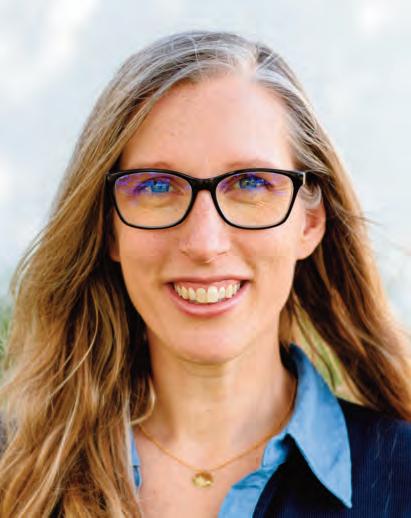
■ Lacey Scully, EDITOR
■ Janae Rempel Shafer, ASSOCIATE EDITOR
■ Shelley Kallsen, GRAPHIC DESIGNER





Pastors often cry last... and alone
Afew years ago, I hung up the phone after a long day of breaking terrible news to our leaders about the death of someone I loved very much. The moment I received the news of her passing, I kicked into gear. I listed the names of who needed a call, I started a game plan to care for the family and spent my day doing what pastors try best to do: identifying and caring for the needs of my flock.
“Pastors
prioritize caring for their congregation, often setting their own needs aside.”
But as I hung up the phone on the final call, I felt overwhelming grief. Alone in my office, I collapsed into my chair, weeping and filled with loneliness. This wasn’t the first time I felt this when caring for others after a death or tragedy.
This experience is quite common in ministry. As I told ministry students over the years, pastors often cry last, and they cry alone.
Pastors prioritize caring for their congregation, often setting their own needs aside. It isn’t a question of Jesus’ sufficiency, but rather a common part of the role. It happens after counseling sessions, after particularly mean comments or after a program feels like a failure. For some, it grows from a gnawing sense that they aren’t doing enough to help grow the church.
A 2023 Barna report highlighted a concerning trend that pastors today feel more lonely and isolated than in the past. A year later, Lifeway Research cited a study showing more than one in three pastors felt frequently alone. Only about one in four reported loneliness to be a rare problem. Yet another recent study suggests pastors of smaller churches are at even greater risk of feeling isolated and alone.
My point isn’t to elicit pity for your pastor; in fact, I am confident they don’t want that. Rather, I hope to raise a bit of awareness and offer a few suggestions.
Your pastor probably won't tell you if they feel a gripping loneliness, or worse, depression. Both because they are doing their best to serve rather than to be served, and for some, it isn’t a safe thing to admit, as they worry their spiritual vitality may be questioned.
So how can you help?
First, if you are a leader, challenge your pastor to develop meaningful friendships outside of the church.
Next, treat your pastor like any other friend. Be curious about their life, invite them fishing or engage them with your circle of friends.
Pray for them, pray with them and encourage them where you see they have made an impact. By nature, ministry is intangible, and much of what a church measures is more directly controlled by the congregants than by the church staff. Pastors often are blind to their successes.
Be kind, be generous, be present, be a friend. It likely will mean more than you realize.
Finally to pastors—if you are lonely today, feel free to give me or your district minister a call.
Don’t suffer alone.
Aaron Box National Director

500 years of Anabaptism
Ayoung woman pleads with the crowd around her as she is led to her execution. She is not begging for her life to be spared but for someone, anyone, to look after her 1-year-old son, Isaiah. Offering her significant wealth as a means to raise the boy, she desperately scans the sea of faces watching her turmoil. Finally, a man, the local baker, steps forward and volunteers to become Isaiah’s guardian. This woman is Anna Jansz and, with her son’s future now in another’s hands, she prepares herself to become a martyr.
Anna Jansz was born to a wealthy family in Biel, Holland, in 1510. In her early 20s, she and her husband, Arent, became inspired to be baptized by an Anabaptist leader who subscribed to a radical and somewhat apocalyptic worldview.
Anabaptists within this radical group believed that, in order to prepare for Christ’s return, they must gain political control. This in turn created a movement of Anabaptists settling in the town of Münster, Germany, to establish the New Jerusalem. By the 1530s, Anabaptists gained majority control of the city council and set about abolishing private property and infant baptism. It became mandatory to be baptized as an adult in order to live in Münster.
At the height of the Münster revolution, the region’s prince-bishop ordered soldiers to gain back control of the city, causing physical violence to break out when the Anabaptists resisted. Because they did not live in Münster, it is unclear whether Anna and Arent supported this violent defiance or if they identified with a pacifist viewpoint. However, Anna penned a triumphant hymn titled “Trumpet Song” that soon became a bittersweet anthem for the revolution, evoking imagery of the Lord’s heavy-handed judgment of earthly leaders and rescue of believers.
Anna became close friends with David Joris, an Anabaptist leader within the renewal movement. Joris’s teachings centered on pacifism and peace. If Anna had not previously identified as a pacifist, Joris’s influence prompted her to do so. This friendship served to strengthen Anna’s faith in Anabaptist beliefs.
In 1538, Anna, her young son and a friend, Christina Barents, traveled together in the Netherlands. While traveling, the two women sang a song associated with Anabaptism. Local authorities caught

Dutch-born Anabaptist Anna Jansz supposedly forfeited her young son to a local baker as authorities led her to be executed for her faith. Etching by Jan Luyken
Domain
wind of the Anabaptist singing and arrested Anna and Christina, sentencing them to be drowned in January 1539—a cruel irony considering their condemnation was due to their belief in adult baptism.
Isaiah Jansz seems to have lived a prosperous life under the care of the generous baker who accepted the child from his heartbroken mother. The boy went on to become the mayor of Rotterdam, Holland—the very city where his mother was killed for her faith.
When he was old enough, Isaiah received a letter that Anna had written to him before her death. In it, she assured him her death was not in vain, that she was now basking in heavenly glory, and she encouraged Isaiah to pursue the Lord.
Anna’s letter ends with this powerful reminder for us all, centuries later: “Honor the Lord in the works of your hands, and let the light of the gospel shine through you. Love your neighbor…O my son, let your life be conformed to the gospel, and the God of peace sanctify your soul and body, to his praise. Amen.”
Angela Vix has served as assistant director of the Center for Mennonite Brethren Studies. She attends Ebenfeld MB Church in Hillsboro, Kan.
Sources:
• anabaptistworld.org
• martyrstories.org
• uwaterloo.ca
Compiled by Janae Rempel Shafer
On Giving Tuesday, Dec. 2, help advance USMB’s shared mission of disciple-making, leadership development and church multiplication. Your gift will equip leaders, strengthen local churches and fuel efforts to plant five to 10 new churches each year.
Momentum is already building, in partnership with our districts. In December, Stony Brook Church in Omaha, in partnership with the Central District Conference, will launch a new campus in Springfield, Neb., a project USMB is excited to support. Groundwork is underway for additional churches and campuses in multiple districts, and two couples are preparing for church planting through residencies. This past summer, high school students grew as disciples at ASCENT, USMB NextGen’s summer camp.
“Our mandate as churches is clear: Go and make disci-
A.J. Swoboda, associate professor of Bible and theology at Bushnell University, Eugene, Ore., and lead pastor of Faith Center, is the keynote speaker for USMB Gathering 2026.

Swoboda has served as a college pastor, church plant pastor and is currently the lead mentor for the Doctor of Ministry Program on Spiritual Formation and Soul Care at Friends University in Wichita, Kan.
Author of more than 10 books, including "A Teachable Spirit," "After Doubt" and "Subversive Sabbath," Swoboda's dynamic, engaging teaching is sure to enlighten and inspire.
Gathering will take place July 21-25, 2026, in Salt Lake City, Utah, with the theme “Cultivate: Living on mission with Jesus.” Registration will open in January. Learn more at usmb.org/gathering2026.
USMB

ples,” says USMB National Director Aaron Box. “When you give to USMB, you are helping to fulfill the Great Commission.”
In the 11 years USMB has been part of Giving Tuesday, donors have contributed more than $264,000 to support this mission, including $8,430 last year. Partner with USMB on Giving Tuesday, Dec. 2. Give securely online at usmb.org/givingtuesday.—USMB
CDC minister Daniel Rodriguez is ordained
Daniel Rodriguez, Central District Conference minister, was ordained Aug. 22 in a service hosted by the Central District Faith and Life Committee and Iglesia Agua Viva in Omaha, Neb.
Roger Engbrecht, former CDC minister, officiated the ordination service, which was attended by conference and district leaders and eight CDC pastors.
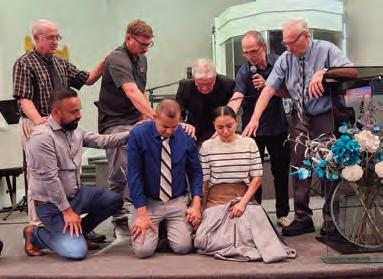
Rodriguez used Psalm 115:1 to illustrate his passion for ministry. He has served as CDC minister since Aug. 1, 2022. Prior to that, he pastored Iglesia Agua Viva for 12 years.
“It seemed appropriate for Central District to ordain Daniel into a life of ministry while serving as Central District's district minister,” says Stephen Stout, CDC Faith and Life Committee chair, in the Sept. 29 CDC Partner newsletter. “After completing all the requirements, including a grueling two-and-a-half-hour interview with several of us conference leaders, he passed with flying colors.”
Rodriguez earned his bachelor’s degree in ministry leadership from Moody Bible Institute and his Master of Divinity in pastoral ministry from Moody Theological Seminary.
He and his wife, Wendy, have two children, Danielantonio and Isabella.—CDC
In 2026, USMB NextGen’s summer camp, ASCENT, will feature a new location—the third in four years—as announced in a Sept. 4 email.
After spending two years at Camp W.O.W. in Stuart, Okla., and three years in Glorieta, N.M., before that, ASCENT 2026 will be held at The Crossing Retreat Center in Lexington, Neb., June 27-July 1.
Kyle Goings, USMB NextGen Director, says moving locations wasn’t planned but became necessary when Camp W.O.W. was unavailable on the ASCENT planning team’s desired camp dates.
After exploring options, the planning team selected The Crossing, which features numerous activities, appealing housing options, all-you-can-eat meals in the cafeteria, a state-of-the-art stage and sound system, plenty of indoor and outdoor spaces, cellphone reception and a central location, Goings says.
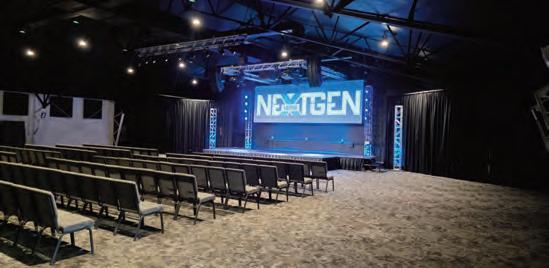
“We’ll miss the momentum we built at Camp W.O.W., but we believe The Crossing takes everything we loved and adds even more opportunities for connection, growth and fun,” Goings says. “We’re confident this move sets ASCENT up for our best year yet.”—CL

Pastors, delegates and guests gathered for worship, equipping and fellowship at the biennial Eastern District Conference convention Sept. 1921 at The Life Center in Lenoir, N.C.
Eastern District minister James Moore welcomed people to the event, themed “Changing lives through Christ.”
A graduation ceremony highlighted Friday’s activities as 10 graduates received certificates in Christian Leadership Studies from World Impact’s The Urban Ministry Institute satellite in Lenoir, led by Clyde Ferguson, EDC educational director.
Terry Hunt, district moderator and senior pastor of The Life Center, led Saturday’s business sessions, with delegates adopting new and amended EDC constitution and bylaws, affirming officers and approving the budget. Delegates also heard updates from ministry partner representatives.
Workshops offered tools and enrichment on topics including stewardship and loan preparation, women in Christ, trauma healing and immigration insights.
On Sunday, three individuals were recognized as licensed for district ministry. USMB National Director Aaron Box challenged attendees to be not only disciples but disciple-makers.
The Life Center praise and worship team led singing throughout the weekend, and the convention ended with communion.—EDC
FPU sees overall increase in enrollment for fall 2025
Fresno Pacific University, Fresno, Calif., welcomed over 1,200 new students in fall 2025. Enrollment has increased from last year, led by growth in both the traditional undergraduate (TUG) and graduate (GRAD) populations.
Overall enrollment is 2,944, up from 2,889 last year. Traditional undergraduate students number 822, while 754 students are in bachelor’s degree completion (DC) programs and 1,368 in graduate programs (including 112 in Fresno Pacific Biblical Seminary). Last year saw 791 students in TUG, 756 in DC and 1,342 in GRAD.
The number of students overall increased by 1.9%.
Some 326 new students began traditional undergraduate programs this fall, with another 496 students returning, a 3.9% increase from last year’s numbers. Graduate programs, including those offered through Fresno Pacific Biblical Seminary, welcomed 364 new students and 1,004 returning students, for a total increase of 1.9%. This is the largest graduate student enrollment in school history.
Degree completion saw 206 new students, with 548 returning.—FPU
| Read longer versions of these and other articles at christianleadermag.com |
Tabor College, Hillsboro, Kan., welcomed a record-setting 193 first-time freshmen in fall 2025, surpassing the previous record of 183 set in 2021, for a total of 567 students on campus. With 116 students enrolled in graduate and online courses and 59 in dual credit, the college totaled 742 students across all programs, marking a 19% increase from the previous year.
Fall-to-fall retention of 78% ties the record that was set in fall 2024.
Tabor’s on-campus, graduate and online students hail from 38 states and 34 countries.
For the third time in four years, Tabor broke its record for incoming freshmen GPA (3.52).
TC
Fresno Pacific University and California Health Sciences University have signed an agreement guaranteeing interviews for admission to qualified traditional undergraduate students from FPU annually to the CHSU College of Osteopathic Medicine Future DOctor Program.
This four-year graduate program provides FPU students with a pathway to a Doctor of Osteopathic Medicine degree.
The six Central Valley counties share large populations of underserved groups and a chronic shortage of physicians. FPU has nearly 2,900 undergraduate and graduate students studying on five campuses in Fresno and other Valley communities. CHSU, with 600 students, is based in Clovis.—FPU
King J. Richter has given Fresno Pacific University $21.9 million to create endowed scholarships for FPU students.
This largest-ever gift to FPU is believed to be the second largest public charitable contribution in Central Valley history. This gift is just the latest example of Richter’s generosity to the university. In 1992, he set up the King J. Richter Annual Scholarship, which is separate from the new endowment.—FPU
From 2011 to 2019, women from multiple denominations in the Denver, Colo., area flocked to retreats organized by Diane Andrews. During the 20 years that she and her husband, Mike, pastored at Mosaic Church in Littleton, Colo., Andrews followed her call to connect women to Christ. She founded a nonprofit, R and R Retreats, drawing together a team of donors to support the ministry, which grew to serve 800 women annually through eight spiritual growth weekend getaways at retreat centers in Denver. When the couple felt a call to pastor Gospel Fellowship MB Church in the rural community of Wolf Point, Mont., Andrews’ ministry changed abruptly.
What was the move to Montana like for you?
It was a big transition. Wolf Point has 2,400 people, two stoplights and 23 streets. In Denver, we were reaching a city. You have to adjust your ministry to match your community.
How did you get started in Wolf Point?
The first year I didn’t do anything— just got to know the town. I had to ask, “What is our reach in this community that is located on a reservation and made up of two distinct groups—Native American peoples and ranchers?” It took time to earn the right to be heard and learn to move in a whole different rhythm.
What new opportunities did you find in Wolf Point?
In the Native communities, meth and alcohol are taking the lives of parents, leaving a lot of grandmas, aunties and uncles raising kids. During COVID, Native Americans also died at a higher rate than other groups. We’re reaching the children through vacation Bible adventure, which has grown from 20 kids to 100. I bring a team of 17 from Denver to help.
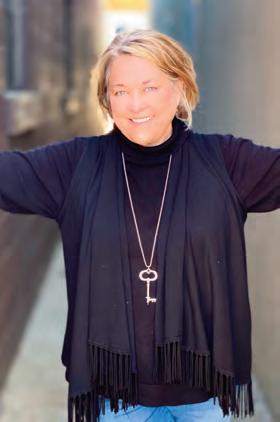
We are also beginning a GriefShare group.
What is your ministry to women?
I’m always looking for women who are abused and hurting and try to get them help—just doing life in this little town with the women. We do Bible studies and classes in fall and spring. R and R pays for the publicity and provides scholarships for women who can’t afford registration. We sometimes have as many as 50 in our classes.
Do you still do retreats?
Yes, but where we are located has completely changed the operation. We can’t do an overnight here in town, so it’s a Saturday event. We meet in our sanctuary and enjoy lunch in our beautiful foyer. God is spreading it out to lots of little towns all over Montana. We’ve had 80-97 women here, including 20-30% Native. We finish our program by 3 o’clock sharp because half the women are driving an hour or more to come, and we want them to arrive home on time. What hasn’t changed is the quality and having Christ as the center.
Interview by Kathy Heinrichs Wiest

The Mennonite Brethren Free Church of Austria (Mennonitische Freikirche Österreich or MFÖ) is a small conference with about 400 baptized members.
With six locations in Vienna, Linz, Wels, Steyr and Gmunden, each MFÖ congregation has between 50 and 130 members.
One of the congregations is made up of two Bruderhof communities. This Anabaptist-rooted community of Christians is known for its communal living and sharing of monetary and material possessions, as inspired by the early church.
In 2017, MFÖ first connected with those in Bruderhof, and by the work of the Lord and some miracles, the Austrian Bruderhof community joined MFÖ and set up their first community in Retz, Lower Austria, in 2019.
Today, 30 people are located in the Retz Bruderhof community, and another 40 live in Stein, which is also in Lower Austria.
The Bruderhof communities appear different from other congregations in MFÖ. They dress differently, speak English as their primary language (although most quickly and seriously have learned German) and focus on a community-based way of life.

Leadership team of the Freikirche Neue Heimat (Free Church New Homeland) in Linz, Austria (from left): Christian Börner, John Fitzurka, Martin Leitner and Francesco Mazzilli (pastor). PhotobyMFÖ
Andreas Ortner, head of the MFÖ Board, shares in an email that MFÖ congregations get along well with their Bruderhof brothers and sisters.
“When we have meetings at one of the Bruderhof sites, I always love to watch them eat together, sing together, pray together or work together,” Ornter says. “There are many aspects in their way of life that I find much closer to the Bible’s teachings in the Gospel and especially in Acts.”
Ortner also shared that MFÖ lives “unity in diversity.”
Ortner says: “As reconciliation is one of our main values as Anabaptists, we are glad to practice this gift from the Holy Spirit and are very thankful for that. Praise be to the Lord.”
The world’s oldest functioning zoo is Tiergarten Schönbrunn located in Vienna.
visitingvienna.com
Austria has produced many famous composers, including Wolfgang Amadeus Mozart.
britannica.com/place/austria
Austria is home to Europe’s tallest waterfall (Krimml Falls).
austria.info

By Cheryl Dueck Smith
Afirst grader begs for a playdate. An isolated middle schooler wanders the school grounds during lunch. A young adult yearns for a life partner. A middle-aged couple longs to camp with a group of friends. A widower eats dinner alone.
Nearly 60 years ago, the Beatles crooned, “All the lonely people, where do they all come from? All the lonely people, where do they all belong?” These questions remain relevant today.The loneliness epidemic does not just affect one age group but spans all generations. Humans are wired for connection, created by God for both intimacy and community. Without it, we fail to thrive, leading to a slew of physical and mental health problems.
Loneliness is a normal feeling that signals a mismatch between what we want and what we have. Our hopes and reality don’t align. Our unmet expectations for the quantity and quality of our relationships create loneliness.
The perception of loneliness is highly individual, differing from person to person. Some people appear isolated yet don’t feel lonely. Others may be surrounded by people yet experience the ache of disconnection. A marriage can be terribly lonely when characterized by emotional distance. A day of solitude might be viewed as a gift or a curse. Having one or two close friends may be met with contentment or
frustration. It depends on the person’s expectations. It also depends on the underlying need. Research points to two types of loneliness: social and intimate. Social loneliness highlights the need for a circle of friends, a community that bears one another’s burdens (Gal. 6:2). Intimate loneliness is the need to share life with someone else, which is often fulfilled by a spouse but could also be met through a best friend, as seen in the friendship between David and Jonathan (1 Sam. 18:1). Expectations shaped by society, the church or social media may increase both social and intimate loneliness.
Loneliness signals that change is needed. Our God-given need for connection and community is not being met. Just like hunger tells you to eat, loneliness tells you to reach out and connect. The problem is that when loneliness is blended with fear, it tells us to withdraw, to protect ourselves from possible rejection. The more we withdraw when lonely, the fewer opportunities we have for connection. The greater disconnection we experience, the more we feel excluded and rejected, making it even more difficult to reach out. This vicious cycle perpetuates loneliness.
At any age, people can get stuck in a cycle of loneliness, struggling with unmet needs for social and intimate connec-
tion. The pain of feeling alone exists throughout our lives, but different types of loneliness prevail at certain stages, based on developmental needs.
Young children (ages 3-7) need playmates, engaging in shared activities and feeling part of a social group. As they grow, children desire close friendships where they feel known and understood, sowing seeds of intimate connection. In middle childhood (ages 7-12), it becomes increasingly important for kids to have a group of friends in which they feel included and accepted. Bullying and social rejection can lead to higher rates of social loneliness at this developmental stage.
Teenagers look for both quality and quantity in friendships. Loneliness in the teenage years is often connected to intimate loneliness, lacking quality connection with a close friend or a romantic partner, but social loneliness also exists when a teenager lacks close friends or experiences rejection or victimization. Teenage boys, who often run in groups, experience greater intimate loneliness. Adolescent girls, on the other hand, may have one or two close friends but may lack a social group, suffering from social loneliness.¹
Young adults (ages 18-21 and older) often face significant life changes at the same time they are needing a friend group or are seeking out a romantic partner. The number of close connections might shift at this stage because of leaving school, relocating, starting a career or dating. Young adults can experience high rates of both social and intimate loneliness in this developmental transition.
Someone once joked that the greatest miracle Jesus ever performed was being a middle-aged man with 12 close friends. In adulthood, marital status is often a buffer against intimate loneliness. However, research shows social loneliness peaks in early and middle adulthood, when it can be difficult for both men and women to form a peer group.²
know that God is their refuge, an ever-present help in trouble (Ps. 46:1). We may encourage the lonely to turn to God, pointing to David’s example (Ps. 25:16).
But having a friend in Jesus doesn’t negate our need for tangible community. God’s solution to loneliness is the church. Psalm 68:6 says, “God sets the lonely in families,” but Paul emphasizes that the church is a new household, the family of God (Eph. 2:19).
So, how can the church address loneliness?
Look for loneliness.
Notice how the two types of loneliness appear in your congregation at different ages and life stages. Remember: intimate loneliness follows a U-shaped cur ve, peaking in young adults and old age, while social loneliness follows a bellshaped cur ve, peaking in middle adulthood.
Embody hospitality.
Hebrews 13:1 reminds us to show hospitality to strangers, remembering those who are neglected. Sometimes, churches can operate as exclusive social clubs instead of places of hospitality. Let’s be brave and intentionally reach out to newcomers and strangers, offering acceptance and belonging to those afraid of rejection.
“God’s solution to loneliness is the church.”
Contrary to common beliefs, many older adults maintain strong intimate and social connections. However, natural changes in this developmental stage lead to higher rates of loneliness for those over the age of 80. Older adults face loss of loved ones, lack of mobility or caregiving responsibilities that contribute to feeling isolated. Single, older adults living alone who don’t participate in social or religious groups experience higher rates of both social and intimate loneliness.
Studies on intimate loneliness reveal a U-shaped pattern, with the highest rates among young people (ages 15–24) and older adults (80+). In contrast, social loneliness tends to peak in middle adulthood, forming a bell-shaped curve.² Disruptions at any stage, such as a breakup or divorce, can lead to intimate loneliness, while geographical moves or job changes often trigger social loneliness, disrupting support networks like church communities.
Where do they all belong?
Churches, when operating as Christ intended, can offer connection for the lonely among us. A lonely person may
Provide service opportunities. Research shows that people who volunteer are less lonely. Ser ving alongside others provides a chance to connect while minimizing the risk of rejection. Churches can build community by creating shared experiences through service, often a less risky and more meaningful option than small talk over doughnuts and coffee.
All the lonely people, from the first grader begging for a playdate to the widower eating alone, need a place to belong. May our churches respond to both social and intimate loneliness across the lifespan by offering connection and community to a lonely world.
Cheryl Dueck Smith is an Assistant Professor of Marriage and Family Therapy at Fresno Pacific Biblical Seminary. She is also a licensed marriage and family therapist at Link Care in Fresno, Calif.
References
¹Maes, M., Vanhalst, J., Van Den Noortgate, W., & Goossens, L. (2017). Intimate and Relational Loneliness in Adolescence. Journal of Child and Family Studies.
²Manoli, A., McCarthy, J., & Ramsey, R. (2022). Estimating the prevalence of social and emotional loneliness across the adult lifespan.

Scan this QR code to read the study on social and emotional loneliness across the adult lifespan.



By Rafael Nunez
Translated by Moises Tagle
Editor’s note: Rafael Nunez originally wrote the following in Spanish. In English, the terms loneliness and solitude can overlap but have different connotations. In Spanish, both concepts carry the same name: soledad. Nunez wrote the following feature using the concept of soledad, which Moises Tagle determined to translate as solitude in certain parts of the story for clarity.
Before talking about solitude, we should consider what it is. Solitude could be considered a negative or positive condition, depending on your attitude toward it.
Viewed as a negative experience, solitude is when someone feels emotionally, spiritually or physically alone, with no one to support or be on their side. A person in this condition will feel abandoned or emotionally isolated and might even experience some level of depression. Someone might not be physically alone and may even be surrounded by people who appreciate or respect them, but they still feel alone. This type of loneliness is negative and hurts.
This was the case of the prophet Elijah when he cried to the Lord in 1 Kings 19:3-4: “Elijah was afraid and ran for his life. When he came to Beersheba in Judah, he left his servant there, while he himself went a day’s journey into the wilderness. He came to a broom bush, sat down under it and prayed that he might die. ‘I have had enough, Lord,’ he said. ‘Take my life; I am no better than my ancestors.’”
Many people currently experience this type of solitude or loneliness, which may be transient and is often ac-
companied by depression or a feeling of worthlessness. Emotionally, feeling alone or abandoned by family and friends is a negative feeling that frequently overwhelms people who are experiencing depression or low self-esteem.
But the solitude you choose, not simply to be alone, but to be alone with God, is a positive kind of solitude that we all need to experience daily, and sometimes for extended periods of time.
This act of seeking God and a spiritual experience is an action that we regularly see in people of God, especially in the Lord Jesus Christ, who frequently withdrew from the crowd and the noise of the world to seek God and pray in solitude.
In scripture, we see how the Lord withdrew into the desert (to a solitary place) to pray.
• Mark 1:35: “Very early in the morning, while it was still dark, Jesus got up, left the house and went off to a solitary place, where he prayed.”
• Luke 5:16: “But Jesus often withdrew to lonely places and prayed.”
This was a constant practice in the spiritual life of him who would be the model and paradigm for the life of believers today and forever.
THE SOLITUDE YOU CHOOSE, NOT SIMPLY TO BE ALONE, BUT TO BE ALONE WITH GOD, IS A POSITIVE KIND OF SOLITUDE.”
Even for married couples, the apostle Paul recommends separating to seek God's face individually and then returning to the marital routine. “Do not deprive each other except perhaps by mutual consent and for a time, so that you may devote yourselves to prayer. Then come together again so that Satan will not tempt you because of your lack of self-control” (1 Cor. 7:5).
But loneliness has always been a part of human life on this earth, and if we look at the situation in the United States, we can see that in recent decades, an increasing number of people are compelled—sometimes against their will—to live alone. This can generate a negative effect on mental and emotional health since God designed humankind to live in community, such as the family nucleus, close relatives, the church and the neighborhood.
This is what we can call self-reliant individualism, a characteristic of postmodernism that establishes the exaltation of the individual as the center of life's meaning, decision-making and truth. Instead of looking to an external authority (such as God, the Bible, tradition or community), postmodernism looks within itself to define what is real, right or meaningful.
Today, it is not uncommon to see the company of a pet preferred as a substitute for the company of a human being, be it a spouse, child, sibling, friend or neighbor. But we do not consider this to be the path God designed for man or woman. In Genesis 2:18, we read, “The Lord God said, ‘It is not good for the man to be alone. I will make a helper suitable for him.’” God's purpose for Adam was not complete solitude or the sole company of animals but rather for him to live in community.
Another type of emotional and socio-spiritual loneliness exists, sometimes under compulsion and sometimes chosen. This is what we might call voluntary or involuntary isolationism. It can occur in older people who have experienced separation from their nuclear family or must face their situation by isolating themselves and living alone.
The individualism of big cities is an ignored reality, and society and the church have turned a blind eye to this real and tragic situation in our postmodern society. According to statistics from the United States Census Bureau, in 1950, only 10% of adults over the age of 65
were living alone in forced or voluntary isolation, but by 2020, the percentage increased to 28%.
As pastors, we pray for the elderly in our nation, knowing that one in four elderly people are experiencing this situation. Per the U.S. Census Bureau, the reality is even more prevalent among women over 75, where this statistic is rising. More than 30% of people experiencing this situation have reported some degree of emotional and psychological depression and feelings of loneliness and abandonment.
Given this situation, what can we, as believers and the church of Christ, do in a postmodern world that is hostile to God's plans for lost humanity?
The church is responsible before God to accompany and help this large number of people by doing what the Lord has commanded us to do: to bring comfort, understanding and love to each person. We only need to open our spiritual eyes to see the crying need of those who live in forced or chosen solitude. The church must open its doors wide to actively and intentionally bring the love of Christ through the gospel to this sector of society.
This world is tired of empty words and religious structures, so we must express our Christianity by bringing practical and selfless love, caring for the elderly who live alone, visiting those who are unvisited and lovingly coming alongside those who suffer.
The church must actively confront the influence of postmodernism that denies the absolute truth of God and promotes social fragmentation, individualism and selfcenteredness. The cultural hostility of the world today must push the church toward a more courageous and challenging witness to God's love and the eternal truth of the gospel of God's grace.
Rafael Núñez practiced medicine for over 30 years in the Dominican Republic and has been the pastor at Mission MB Church in Mission, Texas, since 2010.

Escanea el código QR para leer este artículo en español. Scan the QR code to read this article in Spanish.
By Larry Derksen
The current world population is 8.2 billion, and people are everywhere—in cities, in suburbs and in rural areas. In some places, people nearly live on top of each other, while in other locations, you would have to go several miles to get to the next human.
At one end of the spectrum, the bustle of urban areas can be overwhelming and exhausting, while the silence of social isolation can be deafening. Social media and the internet have us seeing people all around the globe, yet loneliness persists.
But if people are everywhere, why do we feel alone? And is that feeling damaging?
Loneliness can feel mentally painful and overwhelming, but it can also be hazardous to your physical health.

Loneliness isn't limited to geographic location or culture. The National Institute of Health reports that worldwide, 33% of people over 45 years old report feeling lonely most of the time. Of people over 65, 53% experience loneliness and 25% are considered socially isolated. On the other end of the spectrum, 11-20% of those aged 12-15 report feeling lonely at least sometimes.
So, if we all feel down and blue at times, why can’t we power through and shake it off?
As Christians, we aren’t supposed to feel that way, right? You might have heard that “it’s all in your head” or experienced someone treating the issue as a character flaw or easily fixed weakness. But is it more than that? Can loneliness be harmful to us?
A recent study in the July 2023 edition of The Lancet, a peer-reviewed medical journal, found that the physical effects of loneliness are comparable to smoking 15 cigarettes a day. Loneliness triggers the fight or flight reflex in our bodies, which increases stress hormones, like cortisol. Cortisol raises blood pressure and blood sugar.
Let’s use a car as an analogy. Your engine is revved, and the gas tank is full. Your hands are clenched on the wheel, eyes fixed straight ahead. But what if there is no place to go? The engine overheats, and your arms fatigue with the prolonged strain at the wheel. The life of the car is shortened because of increased work and no travel.
The same concept can be attributed to the body. Short-term effects make the body ready to respond to emergencies or perform, but if those systems don’t get
Although as humans we are flawed, the church and the body of Christ are uniquely positioned to bring comfort and connection to a world in need.
a chance to go back to baseline or rest, a cascade of downstream problems start.
As sugars go up, the risk of Type 2 diabetes increases. Increased blood pressure and blood sugars cause cracking and hardening of blood vessels, resulting in decreased mental functioning, insomnia and deterioration of the brain, heart, liver and kidneys. This can shorten a lifespan and degrade quality of life.
Loneliness vs solitude
Is being alone bad? Solitude and loneliness are different things. Being alone gives us a chance to quiet the pace of a chaotic world. It gives us an opportunity for self-reflection and contemplation away from all the
noise. Solitude lets the dust settle, the smoke clear and the still small voice of God to speak to us. However, this must be balanced with our need for community.
So, what qualifies as loneliness? It’s the feeling of sadness when our need for connectedness is not being met. Loneliness is a subjective experience characterized by feelings of emptiness, but it’s important to recognize that feelings are not facts. These feelings can influence our thoughts and our judgment. They can affect our mood and attitude. Once we start down that path, it is a struggle to return to the positive. Our selfworth drains away and is filled with feelings of isolation and despair.
Once it sets in, we desperately search for ways to fill the emptiness, which seem to make the problem worse. We try to fill the hole with a career and move to a big city, but we are surrounded by people we don’t know. We try drugs and alcohol, which numb the pain for a few moments, but the bleeding out of our hope continues unchecked. We scroll endlessly through our social media, and the feeling gets worse because it seems that everyone else has beautiful, fun-filled lives. Then we can’t stop scrolling for fear that we might miss out on something, and life will pass us by. We text a friend, trying to feel connected, but we are met with silence.
What’s the prescription for loneliness?
Is there any hope? What would be my prescription for this malady? Jesus says, “The thief comes only to steal and kill and destroy; I have come that they may have life, and have it to the full” (John 10:10). How do we go from lonely to life in the full? When we are deep in loneliness, these words can seem overwhelming and meaningless. And to some may instill bitterness and anger.
No one chooses to be lonely, but we may be thrust into a situation through no fault of our own. What are we to do?
There are no cookie-cutter formulas or one-size-fits-all remedies for this. That’s both good and bad; there’s no quick fix, but we can take action in a number of ways to have a positive impact on those feelings of loneliness.
Start to assuage personal loneliness by reaching out to family, friends and colleagues. Write a letter, make a phone call or FaceTime a family member. Consider hobbies. Join a quilting club, a model train enthusiast
“Loneliness can kill you, but there is a cure.”
organization or a park-walking group. Libraries offer silent book clubs, which allow people to gather without the pressure of making conversation. Take a step to get involved with others.
As a church, look for those sitting alone or people who don’t seem to talk to anyone. Bravely offer your company, and lift others up. Many people who feel lonely or feel out of place might use their phone as a defense mechanism to shield themselves from the terror of striking up a conversation. Reach out to others who may need our support, but remember that social integration can be a slow process. Be gentle and patient.
What if you can’t be present in church because of distance or physical limitation? Contact the church to see if others are in similar situations and see if using Skype, Zoom, Google Meet or other live video apps is possible. Maybe a midnight Bible study for second shift workers? We can connect in many ways—it just might take a little creativity and thinking outside the box.
One key to making these suggestions work: It takes effort. If we wait for the connection to come to us, we
might be waiting a long time. People may not see us unless they are specifically looking for us. They may not be looking for us if they don’t know we need help. Loneliness can kill you, but there is a cure. It’s not a quick or easy fix, but hope exists. Although as humans we are flawed, the church and the body of Christ are uniquely positioned to bring comfort and connection to a world in need. Patience, understanding and grace on everyone’s part will go far in connecting us together.
Larry Derksen is a family physician in Wichita, Kan., and has over 30 years of experience in the medical field.

To read more about the study published in The Lancet, scan this QR code.
Whether surrounded by people or sitting in solitude, loneliness is something every follower of Christ experiences. You are not alone in your loneliness! In this issue, we invite you to recognize and address how feeling alone can affect you, your loved ones or people sitting by you at church. Check out the additional content online.
Read online at www.christianleadermag.com
Community: The answer for a world that is lonely by Greg Brock "We are facing an epidemic of loneliness," writes Brock. But that's not the end of the story. The church is able to step in and fight the isolation and loneliness that prevails in our world. Read Brock's explanation of how living generously with each other can combat loneliness.
The sacredness of solitude by Chandelle Claassen
Spiritual director and USMB LEAD Coach Chandelle Claassen reminds us how solitude is a spiritual gift, which can ground us in times of turmoil. Follow her on a pilgrimage to rediscover the gift of stealing away with Jesus.
I’ve been working in campus ministry for eight years now. There have been exciting seasons (especially in the last few years) of leading many students to faith and watching in amazement as young adults who I’ve mentored go out and share their faith with their peers.
There have also been some difficult years where I’ve tried to reach out to many students and offer them the chance to serve God’s kingdom at their school, but few have responded. I’ve also seen years where much of the fruit has been invisible, at least to me.
But today, I’m reminded of a small act of kindness that changed the course of my dad’s life—and ended up changing many other people’s lives as well (including mine).
My dad was on a bus one day and met a lady who told him about a book called “Transforming Grace” by Jerry Bridges. He was interested but might’ve forgotten about it as soon as they parted ways. But this woman, a complete stranger, did something simple and generous: She handed him her copy of the book and said, “Would you like to have it?”
Later, my dad read through the book with me, and it radically changed how I understood God’s love. Though I claimed to believe in salvation by grace, I was living as
though I had to earn God’s approval. I often guilted myself for not reading my Bible enough, for not being bold enough, for struggling to overcome sinful habits.
That book helped free me from guilt and shame and led me to trust more deeply in the unchanging grace of God. Aside from scripture, it’s the most important book I’ve ever read.
Since then, I’ve had the privilege of taking many students through it— individually and in group settings. I’ve used it as the basis for large group teachings. I’ve watched it soften hearts and make the gospel message feel real and personal for dozens of students. I would guess that 50, maybe even 100, students have either come to faith or grown in their relationship with Christ because of this one book. All because a stranger on a bus gave it to my dad.
I doubt she had any idea how many people would hear the gospel message because she gave a small gift to my dad. She probably thought he would be the only one to read it—if he read it at all.
But that’s often how God works: through one small act of kindness. Today, I often stop and remind myself that even my small choices matter. For some of my friends and students, I may be the only example of Christ in their life. Every person I
say “hi” to may be going through challenges I can’t see—and I can offer them the love of Jesus through my actions.
But when I fail to be a light to others, I remind myself that God’s grace is more than enough. And that grace frees me to focus on loving God and loving others.
I’m free to stop feeling like I’m not doing enough. I’m free to simply pray, “Lord, help me to honor you with how I spend my time today.”
I’m often surprised to learn just how much my small choices matter.
...that’s often how God works: through one small act of kindness.

A pastor’s perspective
When was the last time you thought about what your pastor does when the church doors are closed? Behind the familiar face in the pulpit is a story few truly see.
Pastors are more than voices on Sunday. They share the rhythm of our cities and towns—the early mornings, the local sports games, the familiar grocery aisles. They celebrate our wins and grieve our losses. And through it all, they, too, long for encouragement.
The reality is that many pastors quietly experience loneliness. A 2021 Barna study revealed that 38% of pastors considered leaving ministry in the past year, citing isolation and emotional stress among the top reasons. They can preach to a full sanctuary on Sunday and still feel unseen on Monday. While some pastors thrive with strong support networks, many long for genuine connection beyond the pulpit.
Pastors carry constant pressure to be present for everyone, even when their own needs feel like they must wait. They grieve losses, worry about family and finances and face personal struggles. As leadership expert Thom Rainer notes, “One of the greatest challenges pastors face is finding safe, trusted friendships.”
That is why friendship matters. Pastors need people who see them as more than their title, friends who offer encouragement, honest conver-
sation, laughter or simply companionship. Friendship doesn’t have to be complicated. Small gestures can have a big impact.
A casual coffee can create space for conversation beyond sermons and church responsibilities. During busy seasons, an invitation to a holiday event or gathering can remind your pastor that they are part of the community they serve. Sometimes, just checking in with a text or call to ask, “How are you?” can make a huge difference.
We must not forget the simplest and most powerful way to support our pastors: prayer. Lifting them up in prayer means asking for their strength, wisdom, encouragement and well-being. Prayer is a quiet but profound way to walk alongside them and show care. In doing so, we also carry their burdens, just as Galatians 6:2 reminds us: “Carry each other’s burdens, and in this way you will fulfill the law of Christ.”
The benefit of these friendships is mutual. When we engage with our pastors as fellow humans, sharing joys, struggles and the everyday rhythms of life, we build a community that is stronger, more resilient and compassionate. A pastor who is cared for can care more freely, listen more deeply and lead with empathy rooted in a lived experience. Caring for those who care for us multiplies grace.
This week, take one small step, pray for your pastor, send a note to say you care or spend time together. Five ways to support your pastor:
• Pray for them
• Send a quick text or call
• Share a coffee or meal
• Invite them to events
• Acknowledge special moments
Pastors need people who see them as more than their title, friends who offer encouragement, honest conversation, laughter or simply companionship.

Stuart J. Curry is the pastor of Salem MB Church in Bridgewater, S.D., and the author of Keeper of the Light: A Christmas Devotional.
questions
finding answers together
Christmastime is here, which has people wondering, “How do churches celebrate Christmas?”
The Advent season is an important time for the global church to celebrate Jesus Christ and remember his birth. This is also a time when communities connect with more people to share God’s hope, peace, joy and love.
In 2024, multiple survey sources said 30% of U.S. adults attended church regularly throughout the year. However, according to a Lifeway Research study in the same time period, “Forty-seven percent of U.S. adults say they typically attend church at Christmastime.” Christmas allows churches to lean into a posture of hospitality and welcome those who are less connected.
Across the world, churches celebrate Christmas through a variety of traditions. Our U.S. Mennonite Brethren family also experiences diverse ways of gathering.
Music is a major part of the Christmas tradition, and many churches celebrate by singing carols, hosting cantatas and remembering the birth of Jesus through children’s plays. Beyond our church congregations, Tabor College has a long-standing tradition of performing Handel’s Messiah, and Fresno Pacific University’s “Lessons and Carols” is a much-loved gathering for students and alumni.
Christmas is also a time congrega-
tions prioritize gathering and celebrating with food and fellowship. Some churches host potlucks or catered meals (a few with table games included!) while others meet for special activities led by other organizations around town.
A women’s group from Abundant Hope Christian Center in Downey, Calif., is preparing a Christmas brunch at a local event center with food, conversation and a silent auction. Georgia Waggoner says the church’s desire is to provide “fellowship for believers, outreach for those who don’t know the Lord and raising funds for missions.”
Every church I heard from shared they intentionally mark the season with generosity, giving both locally and globally. A few groups collect items for their city’s unsheltered population, and others partner with groups like Mennonite Central Committee to send supplies overseas.
Every year North Oak Community Church in Hays, Kan., participates in “Advent Conspiracy” and chooses a project to support—from building beds for foster children to sending encouraging gifts to local teachers. Discipleship Pastor Dave Kumer points out that in addition to fundraising, the church can “get our people involved more intimately or personally” with hands-on help.
A meaningful tradition for churches worldwide is holding Christmas services. Many USMB congregations meet on Christmas Eve to worship
with scripture, Advent reflections and candlelit songs. Author Ann Voskamp reminds us, “The real wonder of Christmas is that we don’t have to make Christmas magical—when we simply enter into the wonder of what’s scriptural.”
Receive and share God’s invitation to celebrate this season. Join with the choir, and proclaim the joy of Jesus’ birth: “Glory to God in highest heaven, and on earth peace to those on whom his favor rests” (Luke 2:14).
The Advent season is an important time for the global church to celebrate Jesus Christ and remember his birth.

Caitlin Friesen, a graduate of Fresno Pacific Biblical Seminary, is married to Ben Friesen and is part of Cornerstone Community Church in Topeka, Kan.
Copper Hills Church emphasizes spiritual practices in community
For the last year, Copper Hills Church in Peoria, Ariz., has been hosting regular sessions focused on the topic of spiritual practices, with the goal of encouraging congregants to live in a way that more closely resembles the life of Jesus.
Dave McKinley, spiritual formation pastor at Copper Hills, never envisioned himself in a pastoral role, but says that helping people connect the dots between their everyday life and what Jesus is doing has become increasingly important to him over the last decade.
The mission statement for Copper Hills is “to help each other increasingly be with, think like and be mistaken for Jesus.” McKinley says that mission “helped me frame my vocation as a participant in the kingdom of God.”
A focus on spiritual practices
McKinley and lead pastor Brad Klassen thought through how they could help their congregation fulfill the church’s mission and landed on the idea of focus-
Dave McKinley, spiritual formation pastor at Copper Hills Church in Peoria, Ariz., leads a spiritual practices session. Attendees gather for an hour to share a meal and learn about the history and purpose of the practice, as well as practical ways to implement it into their lives. Photo by Dave McKinley
ing on spiritual practices. Some of these practices include prayer, scripture, solitude, generosity and sabbath.
“The question is how do we help (believers) love people and care for them?” says McKinley. “If I can get you closer to Jesus, then we could eliminate a lot of problems and have loving, growing communities.”
McKinley says he looks for different people within the church to lead each spiritual practices session based on their own experience with that practice.
“I want multiple experiences and multiple voices to represent the kingdom of God,” he says.
At each session, attendees gather for an hour to share a meal and learn about the history and purpose of the practice, as well as practical ways to implement it into their lives.
Gathering in community
In addition to the twice monthly sessions, the church hosts monthly meetups for participants to come together in an informal environment to talk through their

experiences, share struggles, pray and encourage one another.
“To follow Jesus is to live in community,” says McKinley.
As participation has grown, the organizers added meetups so they have three different times available for people to gather.
Dustin and Jennifer Chafitz currently lead the Saturday morning meetup. They first attended Copper Hills for a Christmas Eve service in 2024.
“That actually was the beginning of our walk with Christ,” Dustin Chafitz says. “As soon as we got there, we were greeted with open arms. Everybody was so incredibly welcoming, and it felt like family instantaneously.”
They began attending Copper Hills regularly for services and then the spiritual practices sessions, and eventually, McKinley asked them to consider leading the meetups.
“It was intimidating,” says Jennifer Chafitz of leading for the first time. “But at the same time, it forces you to really lean into the spiritual practice. It helped us grow a lot more in our journey.”
Dustin Chafitz says they usually begin each meetup with a few basic questions to get the conversation going, but then they let things develop naturally.
“We try to build a family-like environment,” he says. “It’s a non-judgmental space, and to see that is inspiring.”
Jennifer Chafitz says it is helpful to hear how others implement spiritual practices into their own lives, and that gathering in community to support one another is vital.
“Just in talking about it, you learn everybody has their own unique way of doing it, and I think that conversation benefits those that might be struggling,” she says. “We need that connection, that motivation.”—Jessica Vix Allen
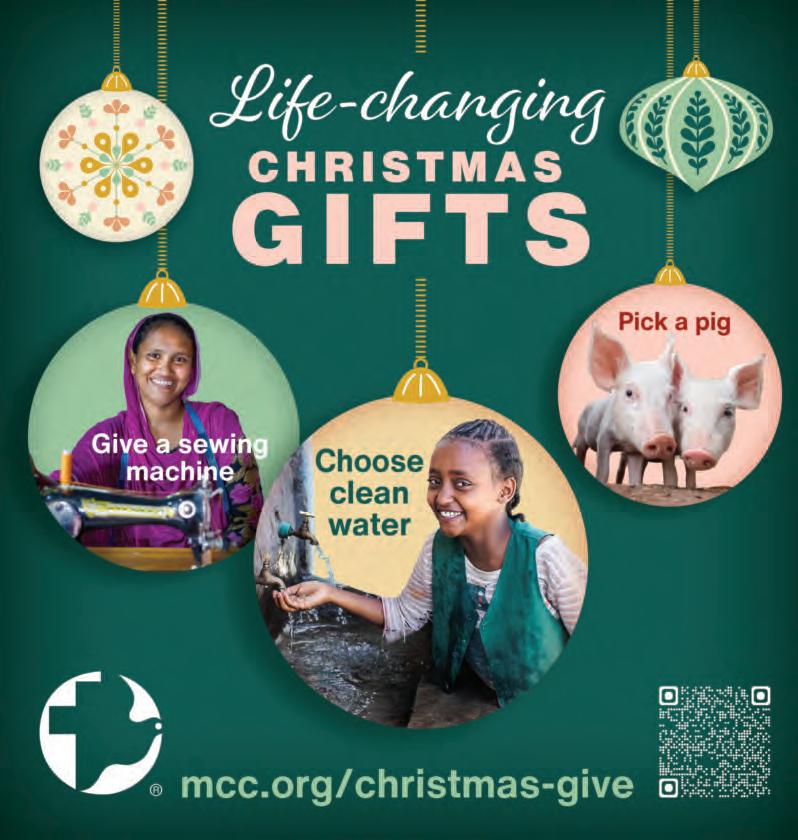

Lincoln Hills Bible Church caregivers offer support in times of struggle
When difficult circumstances strike, feeling alone can exacerbate an already stressful situation.A group of congregants at Lincoln Hills Bible Church in Sioux Falls, S.D., is committed to supporting people through its Stephen Ministry, a branch of a national ministry found in thousands of churches across the world.
“People in general are pretty resilient; we can make it through hard things,” says Tony Randall, lead pastor and Stephen Leader. “Stephen Ministry is designed for when somebody is going through a hard situation, and they’re going to make it through much better with somebody walking alongside them.”
Lincoln Hills currently has seven Stephen Ministers, caregivers who have gone through at least 50 hours of training. Some ministers are also Stephen Leaders, who help with administrating the program and educating the ministers.
Jennifer Mendel has been serving as a Stephen Leader since the ministry began at Lincoln Hills in 2013.
“As a Stephen Leader, we have oversight of how someone becomes a care receiver; we preface it with, ‘We are not mental health professionals or counselors,’” says Mendel. If someone needs professional care, leaders point them in that direction.
When someone is deemed a good fit for the ministry, they are paired with a minister who sets up weekly meetings and provides a supportive, non-judgmental listening ear.
“The primary thing is the one-to-one connection,” says Randall. “It can take some time to build trust, and we’re asking people to be vulnerable.”
Randall and Mendel point to the ubiquity of technology and busyness as factors that can contribute to loneliness, especially during crisis.
“If you go through something really difficult in your life and you feel like people just don’t have time to listen to you, then you stuff the emotions,” says Mendel. “They need somebody to help them express these emotions, to critically reflect on
those emotions. And then the care receiver usually comes up with the solutions that they need.”
“If I were to describe the training, I’d maybe call it the lost art of conversation, or effective listening,” says Randall. “Sometimes people are not sure what they’re feeling inside, and a good listener can discern that.”
Mendel says pairs usually meet until the receiver feels the crisis has passed, and they are equipped to move forward without the ministry. She adds that often a friendship continues even once the formal ministry relationship has concluded.
Randall and Mendel also emphasize the importance of community among the ministers. They meet twice a month for continuing education and to support each other in the sometimes strenuous work of caregiving.
“We don’t share specifics, but we listen to our caregivers, and they give a report of what’s going on in their ministry,” says Mendel. “We value that time to get together.”—Jessica Vix Allen













that the world may know Jesus Explore unique giving opportunities in this year’s gift guide at multiply.net/gifts


On Dec. 6, Hillsboro (Kan.) MB Church will host its third escape room at the city’s annual Down Home Christmas event put on by the Chamber of Commerce.
In 2023, Miriam Kliewer, HMBC office manager and communications director, wondered what it would take for the church to host an escape room during the event. She wanted to use Studio 23, a dance studio owned by lead pastor Jeremy Matlock and wife Krista, head cheer and dance coach at Tabor College.
Seeing the growing popularity of escape rooms, HMBC saw this as an opportunity to have a presence at Down Home Christmas. This day-long, family-friendly event features holidaythemed activities, including breakfast with the Grinch, pictures with Santa, storytime with Mrs. Claus, a live animal exhibit and early gift shopping from a variety of local vendors.
“As a church we want to contribute to the city’s celebration of Christmas,” Jeremy Matlock says. “Creating an escape room gives families one more activity to do together that day. And while doing it, we are able to invite people to our church’s Christmas events if they don’t already have a place to worship.”
Despite having little prior experience designing escape rooms, Kliewer thought it was worth a try.
“I had only done one for a family get-together,” she says. “I had tailormade one, and I told enough people about that, and they thought that would be a neat idea.”
Each year, the church’s escape room has a Christmas-related theme.
In the first room in 2023, baby Jesus had been stolen, so each team had to work together to discover where baby Jesus was and bring Christ back into Christmas.
Last year’s room took place in Ebenezer Scrooge’s study, where teams had to discover the true meaning of Christmas (giving) and then escape to share that with others.
“This year is going to be called Escape to Egypt,” says Kliewer. “It’s based on the story of Mary, Joseph and Jesus having to flee from Herod.”
Each team will have to work together to find Jesus’ passport.
Kliewer writes the storyline herself and combines that with ideas from Pinterest as well as a variety of locks, boxes and puzzles she has collected, using help from her husband, Wayne, to complete the rooms.
Kliewer loves that the escape room gives something for families to do together.
“Families really enjoy it,” she says. “The children have a lot of fun helping solve the puzzles. And we’ve had some adult groups, and they really enjoyed it. I love providing opportunities for families or groups of friends to work on something together, communicate with each other and have a shared memory that is hopefully fun and rewarding.”
The escape room is scheduled to begin every half hour, with the activity lasting 20 minutes, giving Kliewer 10 minutes to reset the room before the next group begins.
It has been so popular its first two years that groups fill up the available signups before the day begins.
Kliewer and the congregation’s goal for the escape room is for it to be an avenue to reach unchurched people in the community.
“We try to keep it Christ-focused as much as possible,” says Kliewer. “We try to bring it back to the real reason for Christmas around the nativity or the season of giving.”—Cody Meyer

Hope Kingsburg (Calif.) becomes second campus of Neighborhood Church
When Pastor Clayton Paull
picked up the phone in December 2024, he knew his congregation needed drastic change.
Hope Kingsburg (Calif.) had seen a slow decline in attendance for a few years, never fully recovering after the COVID-19 pandemic, the resignation of a few youth pastors and the exodus of families with children that followed. Even before, trends in the previous 12 years had shown church demographics to be older in age and smaller in number, with fewer children, youth and young families.
It wasn’t for lack of effort or heart, Paull says. The congregation simply lacked energy and boots on the ground to do the work.
When average attendance dropped from 90 to 50, church elders met with Pacific District Conference minister Jordan Ringhofer to process, pray and discuss options for a path forward.
As former lead pastor of Hope Kingsburg from 2014-20, Ringhofer brought a unique perspective to the table. Ringhofer knew that even the church’s three-year vision project and corresponding name change in 2018—from Kingsburg MB Church to Hope Kingsburg: A Mennonite Brethren Church, or Hope Kingsburg for short—was a call to action, he says.
Now, Ringhofer presented a new
history of Hope
1962
option—merging with another MB church.
So, that day in December, on the other end of Paull’s phone call was Forrest Jenan, lead pastor of Neighborhood Church, an MB congregation of 2,000 about 20 miles down the road in Visalia. Would Neighborhood be interested in expanding its reach with a second campus in Kingsburg, Paull asked?
For Jenan, the idea of expansion had not been a serious consideration. Neighborhood had other irons in the fire with a nonprofit organization, efforts aimed at tackling generational poverty and assisting children through school, and a new community center project. But a few key pieces seemed to line up—Hope Kingsburg was not only within the MB family, it was also within the ideal geographic radius of a campus location, and numerous Neighborhood attendees already drove from the Kingsburg area to Visalia for church—so Jenan entertained the idea.
Conversations continued as leaders explored the proposal and eventually presented it to the Hope Kingsburg congregation, who spent months discerning and praying. Jenan hosted town hall meetings to listen and answer questions and invited Hope
Sunday services begin in Kingsburg with 45 charter members. Kingsburg MB Church is formally organized.
1963
Groundbreaking ceremony on five acres of land at current location purchased for $15,000.
Kingsburg members to come to Visalia to check out the church.
Jenan says he was honest about what the change would mean.
“We talked about death,” he says. “We talked about grief. And we tried to cast vision.”
It was, for some, a hard reality to stomach that Hope Kingsburg would close and reopen as a Neighborhood campus. For all their commonalities— both birthed from Dinuba MB Church, both community-focused—the differences in leadership structure and decision-making methods loomed large. This wouldn’t be a partnership as much as an absorption, merging two faith communities of people into one.
In the end, the opportunities outweighed the cost, and on April 28, 2025, the Hope Kingsburg congregation voted with 92% support to become a campus of Neighborhood Church.
Kathy Heinrichs Wiest, chair of the Hope Kingsburg worship ministries team, speaks to the tension between anticipation and grief.
“When I see all the baptisms and testimonies Neighborhood Church highlights on their Instagram, I love envisioning those things happening in our facility,” she says. “We're handing over to Neighborhood a lot of resources. To think about that being used by the Lord to further ministry in
1979
Happy Days School begins, offering a daycare, a morning preschool program and an after-school program.
Kingsburg is hopeful, but at the same time, it's a huge loss. It's a death of something we've loved.”
Ringhofer, too, acknowledges that change is hard.
“As the (district minister), I grieve with our church for the loss,” he says. “But also, I'm so grateful that God’s provided a way for us to move forward in something that is appearing to be bigger and better than we could have ever imagined.”
With a plan in place, Neighborhood invited Kingsburg attendees to connection events over the summer, including a bowling activity and a worship and prayer night with catered dinner
Hope Kingsburg, meanwhile, held a series of Legacy Sundays attended by former pastors and spouses. At the Sept. 21 Homecoming Sunday, everyone who has been part of the church celebrated and remembered all God has done since the church formally organized in 1962. Ministries throughout the years have included starting the Happy Days
1995 Bethlehem Experience live nativity walk-through begins.









1997 Membership hits a high of 264.
4. Clayton Paull, pastor of Hope Kingsburg (left), hands the microphone to Forrest Jenan, lead pastor of Neighborhood Church, at Hope Kingsburg’s final service. Photo by Steve Wiest 5. Kathy Heinrichs Wiest leads the opening hymn at Hope Kingsburg’s final service, accompanied by organist Don Adams, who has served as organist for more than 50 years. Photo by
2003 Iglesia Agua Viva, a Spanish-speaking MB congregation, begins meeting at the facility.
preschool, Wednesday evening programs, a community garden, a live nativity walk-through and partnering with the Kingsburg Community Assistance Program.
“The greatest successes of Hope Kingsburg’s history and legacy have been when it has done things that are strictly for the community,” Ringhofer says. “And that’s the connection with Neighborhood Church. ‘FOR Visalia’ is their short tagline. That's why this connection fits so well.”
Hope’s final, forward-looking Vision Sunday service on Sept. 28 passed the baton to Neighborhood in anticipation of what God has yet to do.
Starting in October, the Kingsburg campus closed for two months for upgrades and renovations. Two large projects include turning one wing into a kids’ ministry space and creating a patio area outside the worship center, Jenan says. Neighborhood invited Hope Kingsburg attendees to Visalia in the interim before the church reopens on Dec. 7 as a campus, almost a year to the day after Paull’s initial phone call. Jordan Brokaw, Neighborhood Church growth pastor, will serve as campus pastor in Kingsburg, while others have been hired to lead wor-
ship and oversee kids’ ministry. Paull will join the Neighborhood staff in a yet-to-be-determined capacity.
The Kingsburg campus seats 150 and will launch with two services. Jenan anticipates attendees to be a mix of three groups, including Neighborhood attendees who live near Kingsburg, Hope Kingsburg attendees and unchurched people from the region.
For Neighborhood, it’s an opportunity to expand its reach to a new city, and leaders have already reached out to the superintendent of schools and city manager offering to help.
“We are extending what God is already doing right here,” Jenan said in a May 18 sermon announcing the new opportunity to the Visalia congregation. “I’m convinced that every community deserves to have at least one church like ours, that’s outwardfacing, that’s committed to adding value to their city and a place where unchurched people love to attend.”
For Hope Kingsburg, this is not the end of the story, Paull says, just as Jesus’ crucifixion was not the end, but rather the beginning of new life. Paull likens it to the story in John 12 about the kernel of wheat that falls to the ground and dies, producing many seeds.
“We can choose to allow ourselves to die in such a way that God can birth something new from within it,” Paull says. “It will look different moving forward, but this is not the end of the church.”
Ringhofer is hopeful this might be a model for other churches to consider.
“Ultimately, if a church closes but then is replaced by a church that has a vibrant, active, evangelical, Anabaptist ministry and witness that’s seeing people come to know Jesus and changes the community, that's not a church closing,” Ringhofer says. “That's a church finding new life.”—Janae Rempel Shafer

2017
A community garden is developed on church property with 24 plots for rent.
2018
Church name changes to Hope Kingsburg: A Mennonite Brethren Church.
2025
Hope Kingsburg closes and reopens as a campus of Neighborhood Church.
The story continues… Check out more photos, memories and ministries at christianleadermag.com
Top: Congregants celebrate a new-believer baptism during Sunday service. Middle: Forty kids attended Valleyview’s vacation Bible school this year, which was filled with Bible learning, games and, of course, snacks. Bottom: Valleyview Bible Church youth group provides high school and junior high students an opportunity to connect with each other and engage in worship, Bible lessons, small group time, games and snacks each Week. Photos by VBC
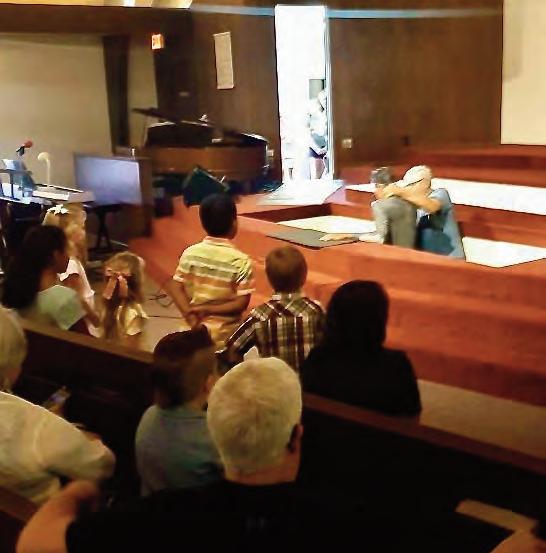


Established: 1922
Attendance: 45
Lead Pastor: James Mather

Our congregation in three words: Loving, generous,faithful
Connect with us! valleyviewcimarron.com facebook.com/Valleyview.MB youtube.com/@ValleyviewCimarron
How can you pray for us?
Pray that we:
• Faithfully present the gospel to the unsaved of our communities, nation and world.
• Lead others to faith in Jesus Christ.
• Establish and equip the Christian life of each person attending this church by providing opportunities for worship, instruction, fellowship and service.
• Be successful in making authentic disciples of the Lord Jesus.
Valleyview Bible Church celebrated its 100th anniversary Nov.1-2. Most of the living former pastors joined a Saturday evening worship celebration followed by cake and ice cream,and attendees celebrated with a Hillsboro sausage meal after Sunday service.
Compiled by Janae Rempel Shafer
Baptism/Membership
Murray Day, Colson Brewer, Tripp Miller, Gibson Graham, Jason Thorne and Aspyn Thorne were baptized Sept. 21 at Pine Acres Church, Weatherford, Okla . Natalie Hutchings was baptized Aug. 17.
Eight people were baptized Sept. 21 at Lakeview Church, Stansbury Park, Utah
Jennifer Kellsy was baptized Sept. 14 at Renewal MB Church, Rapid City, S.D. Dalton Maurstad was baptized Aug. 31.
Courtnie Moore, Devany Morrow, Owen Wiebe, Ahrad Nathan, Aneese Lucas, Johnny Kennedy, Wes Robinson, Roxann Jasso, Scarlett Verdesoto, Gabriel Verdesoto II, Brenden Beck, Aubrie Beck, Tanner Dorrance, Erica Critchfield, Megan Allen, Alexandra Bowser, Jen Holdaway, Hunter Taylor, Amber Sloan, Kristen Parker, Chandler Smith, Brian Sloan, Alyssa Timlick, Rydin Timlick, Betty Giron, Nevi Brady, Victoria Hernandez, Andrea Barreto, Anabela Rodriguez, Fernando Jose, Manuel Castillo, Miguel Castillo, Yoselyn Monsalve, Oscar Zuleta, Nelson Hinojosa, Yessika Rojas, Joanna Ortiz, Jacob Ortiz, Amaira Vigorena, Jeyneth Gomez, Carol Juyar, Isabella Rodriguez, Maria Jose, Kamila Quintero, Alvaro Luis Ortega Acosta, Juan Manuel Laverde, Marcela Viera, Lindsey Heberling, Miley Allen, Tommy Madsen, Duke Mundy, Skylee Mundy, Zoe Parker, Charley Parker, Scott Timlick, Karen Roa, Sara Hernandez and Alvin Olsen were baptized in
August at South Mountain Community Church, Utah Makenna Tell was baptized June 19 at Lehi (Utah) Campus. Tracy Hamel-Jester, Jennifer Thompson, Kinley Nelson, Brayden Garn and Kaylee Garn were baptized at South Jordan (Utah) Campus
Katie Farrall, Kate Haidle, Emersyn Oswald, Riley Quiring and Sydney Rempel were baptized Aug. 24 at Living Hope Church, Henderson, Neb
Diane Krehbiel, Dustin Galyon and Marissa Galyon were received as members Aug. 24 at Hesston (Kan.) MB Church
Daniel Hair, Keith Robertson, Maci Schaeffer and Jakson Sprenkle were baptized Aug. 24 at North Oak Community Church, Hays, Kan
Scott Rodgers was received as a member Sept. 7 at Faith Bible Church, Omaha, Neb Eli Tremaine, Kenzee Knox and Steve Wright were baptized Aug. 24.
Four people were baptized Aug. 17 at Axiom Church, Peoria, Ariz
Ten people were baptized Aug. 17 at Copper Hills Church, Peoria, Ariz
Ariel Humphrey was baptized Aug. 17 and received as a member Aug. 24 at Corn (Okla.) MB Church
Alaina Logan and Sara Van Bergeijk were baptized Aug. 17 at Koerner Heights Church, Newton, Kan.
Sem Lugo, Emilia Lugo and Malaquias Lugo were bap-
tized and received as members Aug. 10 at Community Bible Church, Mountain Lake, Minn .
Morgan Dawson, Cameron Dawson, Brynn Riley, Riley Garrett, Henry Garrett, Morgan Kelley, Dustin Delgado, Hilda Conrade, Kathryn Weide, Paxton Sweet, Kate Stull, Owen Holdeman, Kaitlyn Salazar, Jensen Salazar, Jaden Salazar, Olivia Majher, Gillian Majher, Ryan Martin, Asher Clark, Steve Long, Emersyn Holdeman, Patty Savely, Kaitlin Bazzelle, Christina Hamm, Layla Powell, Ethan Zimmerman, Maddison Graham, Gemma Dennis, Sawyer Rizzo, Zoey Langhofer, Van Horchem and Darrell Owen were baptized Aug. 10 at Ridgepoint Church, Wichita, Kan. Brad Rolen, Desirae Rolen, Kyra Rolen, Donna Roths, Jim Roths, Josh Schueler, Gabrielle Schueler, Jeff Scully, Lacey Scully and Will Klassen were received as members.
Ava Holzrichter, Lauryn Holzrichter and Drew Reddig were baptized and received as members in July at Lustre (Mont.) MB Church. Jared Holzrichter was received as a member July 27.
Jim Shirk concluded his service as executive advisor at Copper Hills Church, Peoria, Ariz.Nikki Eancheff began serving as executive director.
Kyle Young concluded his service as executive pastor Sept. 30 at North Fresno (Calif.) Church. Shakita Perry began serving as executive administrator.
Ron Herms began serving as interim lead pastor Sept. 1 at Butler Church, Fresno, Calif
Central District minister Daniel Rodriguez was ordained in an Aug. 22 service at Iglesia Agua Viva, Omaha, Neb.
Wyatt Dickinson concluded his service as music minister Aug. 18 at Parkview MB Church, Hillsboro, Kan
Rick Eshbaugh was installed as lead pastor Aug. 17 at Ebenfeld MB Church, Hillsboro, Kan
Bartel, Elsie May, Colony, Okla., member of Corn (Okla.) MB Church, Sept. 11, 1936—Sept. 4, 2025. Parents: John J. and Helen Karber. Spouse: Jonathan Bartel. Children: Janet Thiessen, Howard, Paul; eight grandchildren, 14 great-grandchildren.
Blosser, Darrell , Hays, Kan., member of North Oak Community Church, Hays, Feb. 21, 1939—Sept. 20, 2025. Parents: Aquila and Mabel (Frey) Blosser. Spouse: Joyce E. Sommerfeld (deceased), Diana M. Robbins. Children: Valerie Juillerat, Lonnie, Rick, Jonathan Robbins; 11 grandchildren, 10 great-grandchildren.
Brickbealer, Donald Clifford, Lynden, Wash., attender of Birch Bay Bible Community Church, Blaine, Wash., July 17, 1938—June 24, 2025. Spouse: Agnes. Children: Maritia, Donna, Georgia, Arnold; nine grandchildren.
Broce, Bill Eldon , Lost Springs, Kan., of Parkview MB Church, Hillsboro, Kan., May 26,
1938—Oct. 31, 2024. Parents: Harold and Ruth (Osborn) Broce. Spouse: Dorothy Jackson. Children: Mike, Michele Mettner; five grandchildren.
Buller, Gladys K., Hillsboro, Kan., member of Parkview MB Church, Hillsboro, Sept. 20, 1930—Nov. 27, 2024. Parents: Harry and Helena (Klassen) Friesen. Spouse: Kenneth “Bud” Buller (deceased). Children: Brad, Mike, Jon; two grandchildren, two greatgrandchildren.
Cary, Patricia Anne , Wichita, Kan., member of Ridgepoint Church, Wichita, Sept. 1, 1931—Sept. 10, 2025. Parents: Ronald and Ellen Warren. Spouse: Harold Cary (deceased). Children: Steven, Rebecca Eubanks, David, Martha Kessler, Ruth Farrell; nine grandchildren, 24 greatgrandchildren.
Cunningham, Ruth Ann, Dubuque, Iowa, former MB pastor’s wife, Sept. 19, 1945—Sept. 24, 2025. Parents: Clyde and Gertrude (Strader) Ewing. Spouse: Lyle Cunningham. Children: Lance, Chad; six grandchildren.
Dobrinski, Joshua David , Hinton, Okla., attender of Corn MB Church, Nov. 25, 1977— Sept. 9, 2025. Parents: Thomas and LaDonna (Cagle) Dobrinski. Children: Joshua.
Ehresman, Charles “Chuck” Leslie , Wichita, Kan., member of Ridgepoint Church, Wichita, July 3, 1933—Sept. 12, 2025. Parents: Charles “Les” and Hazel (Carlson) Ehresman. Spouse: Jacqueline Conrie (deceased), Josephine (Faul) Griswold. Children: Terry, Richard; four grandchil-
dren, seven great-grandchildren.
Garrett, Joshua Wayne , Wichita, Kan., member of Ridgepoint Church, Wichita, March 18, 1985—Sept. 30, 2025. Parents: Gary Garrett and Debbie Chippeaux. Spouse: Lindsay Fosnight. Children: Riley, Henry, Brody, Jackson.
Gerbrandt, Betty Jean (Nachtigall) , San Jose, Calif., member of Lincoln Glen Church, San Jose, Jan. 2, 1929—July 16, 2025. Spouse: W. John Gerbrandt (deceased). Children: Carol Garza, John; seven grandchildren, 17 great-grandchildren.
Gingerich, Mahlon D., Spooner, Wis., member of Exeland (Wis.) Mennonite Church, July 3, 1929—Aug. 15, 2025. Parents: David and Rose Gingerich. Spouse: Laura Miller. Children: Roseann Schrock, Ronald, Sandra Swantz, Donna Sensenig, John, Daniel, Regina Hershey; 28 grandchildren, 85 greatgrandchildren, two great-greatgrandchildren.
Hee, Terry Lynne , Birch Bay, Wash., attender of Birch Bay Bible Community Church, Blaine, Wash., April 17, 1949—June 10, 2025. Parents: Len and Esther Holland. Children: Kevin (deceased), David.
Jantz, Galen D ., Inman, Kan., of Zoar MB Church, Inman, Jan. 5, 1941—July 27, 2024. Parents: Evan and Susan (Unruh) Jantz. Spouse: Carol. Children: Tawny Hoffman, Misty Jantz, Ebanee Lynn (deceased). Stepchildren: Roger Whitlock (deceased); three grandchildren, five greatgrandchildren.
Janzen, Ellen M. , Reedley, Calif., member of Reedley MB Church, March 12, 1928— July 8, 2025. Parents: Sam and Justine Vogt. Spouse: Marvin Janzen (deceased). Children: Stan (deceased), Kathy Minnehan, Patty Thiesen, Bev Klassen, Bruce; eight grandchildren, 16 great-grandchildren.
Jensen, Eileen Elizabeth, Hays, Kan., member of North Oak Community Church, Hays, June 29, 1944—June 22, 2025. Parents: Everett and Ora Marshall.
Kleinsasser, Leland Paul, Huron, S.D., member of Bethel Church, Yale, S.D., Nov. 12, 1934—Aug. 4, 2025. Parents: Paul and Elizabeth (Stahl) Kleinsasser. Spouse: Sharon Toews. Child: Brent; three grandchildren, six great-grandchildren.
Kliewer, Elinor R. , North Newton, Kan., member of Hillsboro (Kan.) MB Church, Dec. 8, 1933—Sept. 7, 2025. Parents: Henry S. and Emma Boese Ewert. Spouse: Jonah C. Kliewer (deceased). Children: Jan, Joan Kennedy, Ken, David; 11 grandchildren, six great-grandchildren.
Kostanoski, Stanley Lawrence , Ferndale, Wash., member of Good News Fellowship, Ferndale, Dec. 23, 1942—Sept. 25, 2025. Parents: John and Georgia (Klinger) Kostanoski. Spouse: Phyllis Hanson. Children: Kristine, Scott, Cheryl; four grandchildren.
Martens, Larry Don , Clovis, Calif., former pastor and seminary president, member of North Fresno Church, July 22, 1936—Sept. 14, 2025. Parents: Albert and Minnie
Martens. Spouse: Kathleen Kliewer. Children: Michael (deceased), Lorlyn Bartel, David, Teresa McCreary; six grandchildren, four great-grandchildren.
Martin, Brian L., Wichita, Kan., member of Ridgepoint Church, Wichita, Aug. 18, 1962—Aug. 15, 2025. Parents: Malty and Wanda Sue Martin. Spouse: Jodi Martin. Children: Alissa Kusnerus, Emily, Alex; three grandchildren.
Michels, Judith Ann “Judy,” Buhler, Kan., member of Buhler MB Church, June 28, 1943— July 25, 2025. Parents: Ernest I. and Elma A. (Duerksen) Schroeder. Children: Stacie Borge; two grandchildren.
Mullendore, Barbara Ann, Fresno, Calif., member of Butler Church, Fresno, April 7, 1953—Sept. 10, 2025. Parents: Ernest and Ruth (Tuftte) Brynolf. Children: Gary, Rachel, Alta and adopted children; 10 grandchildren, two great-grandchildren.
Neufeld, Ronald John , Bakersfield, Calif., member of Rosedale Bible Church, Bakersfield, Sept. 3, 1952—July 24, 2025. Parents: Wesley and Anna (Quiring) Neufeld. Spouse: Gail (Unruh) Neufeld. Children: Brian, Matthew, Cynthia Houchin; eight grandchildren.
Neufeldt, Viola Aldene , Hutchinson, Kan., member of Zoar MB Church, Inman, Kan., Aug. 19, 1931—May 8, 2024. Parents: G.R. and Margaret (Esau) Thiessen. Spouse: Eldon Neufeldt (deceased). Children: Virginia Philbrick, Cheryl Carlson; two grandchildren, three great-grandchildren.
Plenert, Sue Ann, Buhler, Kan., member of Buhler MB Church, April 23, 1932— Aug. 12, 2025. Parents: John S. and Elizabeth (Esau) Schroeder. Spouse: Vernon A. Plenert (deceased). Children: Bev Heim, Sharon Janzen, Laurie Isaac; 10 grandchildren, 19 great-grandchildren.
Rayburn, Donna D., Fresno, Calif., member of North Fresno Church, 1942—July 15, 2025. Spouse: Chuck Rayburn. Children: Greg, Cheryl Spinelli; two grandchildren.
Rorstrom, Priscilla F., Hays, Kan., attender of North Oak Community Church, Hays, March 26, 1937—Aug. 23, 2025. Parents: Ralph and Ella (Cornish) Freeman. Spouse: Eric G. Rorstrom. Children: James, John; four grandchildren, three great-grandchildren.
Smith, Katherine Diane (Shultz) , Shafter, Calif., mem-
ber of Shafter MB Church, May 9, 1947—Aug. 23, 2025. Spouse: Wayne Smith. Children: Christopher, Johnathon; two grandchildren.
Valenzuela, Serenity Love , Fresno County, Calif., attender of North Fresno Church, Feb. 23, 2019—Sept. 13, 2025. Parents: Rogelio “Roy” Valenzuela and Genevieve Ochoa.
Valle, Jezreel Victoria , Fresno County, Calif., member of North Fresno Church, Aug. 4, 2008—Sept. 13, 2025. Parents: Robert Valle and Genevieve Ochoa.
Valle, Robert “James , ” Fresno County, Calif., attender of North Fresno Church, June 16, 2010—Sept. 13, 2025. Parents: Robert Valle and Genevieve Ochoa.
Vaughn, Frances (Wittrig) , Holcombe, Wis., member of Exeland (Wis.) Mennonite Church, Sept. 30, 1947—
May 27, 2025. Parents: Russ and Ina (Roth) Wittrig. Spouse: Melvin “Lonnie” Vaughn. Children: Brian, Lonnie (deceased); four grandchildren, four great-grandchildren.
Wichert, Norman Dean , Fairview, Okla., member of Fairview MB Church, Aug. 30, 1933—July 22, 2025. Parents: Emil and Dora (Reimer) Wichert. Spouse: Lorene Mildred Kliewer. Children: Brenda Sechrist, Lori DeLester; six grandchildren, one greatgrandchild.
Zerbe, Benjamin “Ben , ” Westminster, Colo., MB pastor and member of Lustre (Mont.) MB Church, June 15, 1926—May 20, 2025. Parents: William and Maria Redekopp Zerbe. Spouse: Esther Reddig (deceased), Marilyn Olfert Berg (deceased), Doris Chase. Chil-
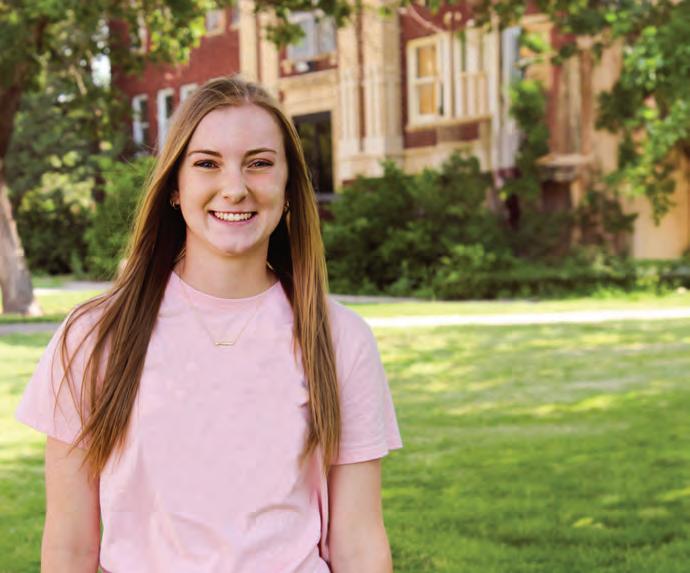
dren: Carolyn Zerbe Enns, Douglas, Gordon, Nathan, Dorinda Zerbe Cornelsen; 10 grandchildren, 10 great-grandchildren.
Community Bible Church, Olathe, Kan., hosted a workshop on prayer Aug. 17.
Cornerstone Community Church, Topeka, Kan., hosted a women’s conference on conflict resolution Aug. 15-16.
Redemption Church, Owatonna, Minn., celebrated seven years Sept. 7.
Music Minister: Parkview Mennonite Brethren Church, Hillsboro, Kan., is seeking a part-time music minister. The basic requirement for the music minister is to be effective at leading people in worship through song. In addition to musical skill, he or she must be able to lead and organize volunteers and perform many administrative tasks connected to planning the worship service. The position requires positive, continual communication with pastors, staff and volunteers. For more information, contact Tom Byford at tom@parkviewmb.com.








Discipleship Pastor: Bethesda Church, Huron, S.D., is seeking a full-time discipleship pastor, integral to leading our ministry programs, which are designed to grow believers into godly disciples for the glory of God. The discipleship pastor will focus on empowering leaders within our diverse range of ministries by providing essential resources, recruitment support, training and pastoral care. Our goal is to develop strong leaders who can effectively guide and nurture the spiritual growth of our church community. The discipleship pastor will work closely with the senior pastor, serving as a key partner in creatively devising new strategies to cultivate healthier disciples. For more information visit the church website.
Director of Financial Discipleship: MB Foundation is seeking a Director of Financial Discipleship to champion biblical stewardship, serve churches and pastors, encourage generosity and promote MB Foundation and the services we provide to pastors, churches and ministries throughout the MB family. This position will office out of Hillsboro, Kan. If interested, visit www.mbfoundation.com/employment.
